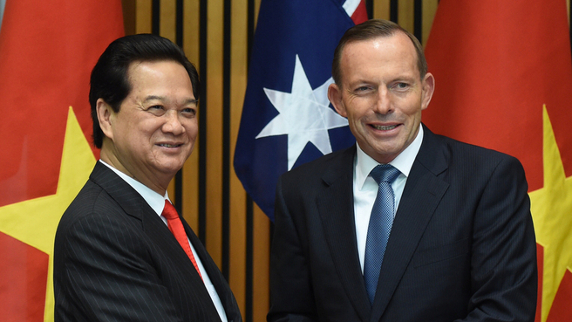Media
Australia to train with former foes
Lisa Martin
AAP, as published in The Australian, 18 March 2015
Vietnam and Australia will undertake joint military training as part of increased bilateral ties.
FORMER military foes will train alongside each other as part of increased bilateral ties between Australia and Vietnam.
FORTY years on from a war that divided Australia and united Vietnam, the leaders of both nations have signed a broad-ranging deal on issues from security to climate change.
But not everyone was pleased with a visit to Canberra by Vietnam’s prime minister Nguyen Tan Dung on Wednesday.
About 200 protesters gathered outside Parliament House as Mr Dung held talks with Prime Minister Tony Abbott.
They chanted “traitor”, accusing Mr Dung of conceding land and sea to China.
They were also unhappy at his record of jailing internet bloggers and songwriters.
In welcoming Mr Dung, Mr Abbott reflected on the military might of Vietnam.
“We Australians know well the power of the Vietnamese Army,” he said, recalling a time when the two nations were at war.
But friendship and co-operation were the firm focus for both leaders after an official signing ceremony.
“It is a tribute to the magnanimity of our peoples and a testament to the ability of our peoples to focus on our common interests,” Mr Abbott said.
Australia and Vietnam had a strong shared interest in peace and stability in the region, he said.
Under the deal, 120 Vietnamese military personnel will train in Australia and take part in joint exercises.
Mr Dung said the leaders had agreed on the need for maritime security and freedom of navigation in the South China Sea, an area of territorial tensions between China and some of its neighbours including Vietnam.
“(We must) exercise self-restraint and refrain from actions that may escalate the tension in the region, including the use of force to unilaterally change the status quo,” he said.
Mr Dung said the agreement with Australia also included English-language training, peacekeeping missions, expanded co-operation for special forces, search and rescue, and response to disasters, epidemics and climate change.
The talks came as leading Asia-Pacific analyst said Australia’s bilateral relationship with Vietnam was fast eclipsing that of Thailand.
Mr Abbott defended his government’s decision to cut its foreign aid budget by $11 billion over several years, a move aimed at bringing its budget under control.
Australia had allocated an estimated $138.9 million of official aid to Vietnam in 2013-14, an $8.9 million reduction on the previous year.
VIETNAM AND AUSTRALIAN RELATIONS:
- 42 years of diplomatic relations
- Total two-way trade between Australia and Vietnam in 2013 was about $7.8 billion, representing 1.2 per cent of Australia’s total trade.
- Vietnam is the second biggest coffee producer in the world.
- Australian aid to Vietnam was $138.9 million in 2013-14.
- 24,000 Vietnamese are studying in Australia each year.
- 221,114 people in Australia claim Vietnamese ancestry.
(Source: Department of Foreign Affairs and Trade)
WHAT’S IN THE COMPREHENSIVE PARTNERSHIP DEAL:
- Cooperation on defence and security matters, law enforcement and transnational crime.
- Increases people-to-people links.
- Reaffirms shared interest in promoting human rights.
- Strengthens education, agriculture links.
- Cooperation on environmental protection and climate change action.
- Joint crackdown on people smuggling and human trafficking
- Cooperation on counter-terrorism, special forces and war legacy issues.
(Source: Comprehensive partnership declaration)
This article was originally published here.
Lisa Martin participated in the masterclass during the 2015 International Development Journalism Fellowship.
